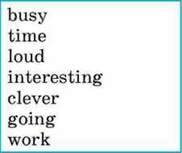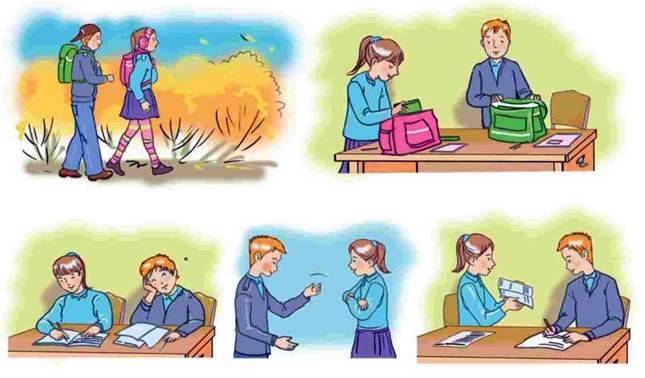School Routine
Unit Three: School Life
3.1. School Routine
Word Bank | Phrase Bank | Communication Box |
Punctual Well-planned To manage Absent-minded Routine assembly hall To crib | To work hard on something To waste time To do everything in time To plan ahead To do something in the last minute To make a mess of something To be late for something To sign up for something | Normally… Typical! Just typical… That won’t do! Don’t give up! |
I. Conversation Warm-up
Look at the pictures and say what these places have to do with school routine.

Computer class
Language lab
Assembly hall
Canteen gym
Example:
II. Pronunciation Warm-up
Read and practise the sounds /w/ and /з:/. Say what you think about the pupil’s time management.
TIME MANAGEMENT RHYME
I work hard on Geography,
I work hard on Algebra,
I work hard on History
What a hard-working person I am.
Dan wastes time at the lesson,
Dan wastes time after school,
Dan wastes time in the evening.
What a lazy bones he is.
III. Grammar Smart
1. Look and recall.
1) to ask for permission use may;

2) to ask about necessity use must;

3) to ask about possibility use can.

A) Play a grammar chain game and ask your friend for the permission.
Example: A: May I take your book?
B: Yes, you may. May I close the book?
C: Yes, you may. May I… ?
B) Complete the questions.
Example:
1. Can you…? 4. Must you…?
2. Must I…? 5. May we…?
3. May I…? 6. Can Dan…?
 2. Look and remember!
2. Look and remember!
1) To prohibit in a short answer use “No, you mustn’t”.
Example: – May I go out?
– No, you mustn’t.
2) To stress unnecessity of something in a short answer use “No, you needn’t”.
Example: – Must I translate the text?
– No, you needn’t.
A) Answer the questions.
1. May you leave the classroom during the lesson?
2. Must you go to school on Sunday?
3. Must your little sister/brother play all days?
4. May you be late for classes?
5. May you sing during the lesson?
6. Must your neighbour at the desk talk during the lesson?
B) Put the questions to the answers given.
Example: – Must I translate the word?
– No, you needn’t.
1. No, you mustn’t.
2. No, you needn’t.
3. No, they can’t.
4. No, he needn’t.
5. No, she mustn’t.
6. No, I mustn’t.
IV. Word Smart
1. Study these words and phrases and speak about:
A) well-planned school routine:
To work hard on something; to do everything in time;
Well-planned; punctual;
To plan ahead; to manage;
To sign up for.
Example: I work hard on all the subjects.
B) a badly-planned school routine:
To waste time; to do something in the last minute;
To make a mess of something; to be late for something;
Absent-minded.
2. Paraphrase the sentences.
Example: – I study in the sixth form. → I am a sixth former.
1. Nick comes to school in time.
2. Ann plans her time beforehand.
3. Val joined a new sport society.
4. As a rule, we do a lot of things at school.
5. Children work much at the lessons.
6. My brother often forgets things.
At home: Describe your school routine and decide if it is well-planned. Give your reasons.
Go to Ex. 37, 38 of your Workbook
V. Time to Listen and Read
1. Listen to / read in pairs and say what piece of advice Ann gave to Steve and why.
TALKING ABOUT SCHOOL ROUTINE
Steve: Hey, Ann! How are you doing? I bet, you’ve done all the lessons. May I take your copybook?
Ann: No, you mustn’t. You can’t crib all the time. I was working hard on all the subjects the whole evening yesterday. I managed to do all my lessons orally and in writing.
Steve: How clever of you! You’ve always been a model girl, Ann.
Ann: Do you mean to say that you didn’t do any lessons? They are not too difficult.
Steve: Frankly speaking, I did something in the last minute, but not half enough.
Ann: Typical, just typical! You always waste your time. What a lazy bones you are! Do everything in time.
Steve: It’s easier said than done. My friend gave me a CD with a new film about Harry Potter. I couldn’t help admiring it! And then I was watching the Simpsons on TV.
Ann: That won’t do! We had only four lessons yesterday and you had enough time to get ready for the next school day. You are too lazy, Steve. You don’t want to make a mess of your life, do you?
Steven: Of course not. I’ll be punctual and plan my day ahead next time.
Ann: That’s better! Try a little harder.
Steven: I’ll try. I’ll try.
– half enough
– enough time
– too difficult
– too lazy
See First Aid Kit:
Grammar, p. 212
Across Culture

Harry Potter – головний герой роману англійської письменниці J. Rowling, за яким знято вісім фільмів.

The Simpsons – американська гумористична телевізійна програма про родину Сімпеонів.
2. Complete the sentences with enough, too and words from the list.
Example: I’m, too busy today.
1. The book isn’t… for me.
2. Hurry tip! You are……… slowly.
3. Steve hasn’t……… to finish his test.
4. We have………. at every lesson.
5. Turn off the music, please. It is…….
6. My sister is a top pupil. She is…….
3. Read the sentences and say who said them and why. Reproduce the situations from the text.
Example: “Try a little harder”. → Ann says it to Steve, because he is too lazy.
1. It’s easier said than done.
2. You can’t crib all the time!
3. Typical, just typical!
4. I did something in the last minute, but not half enough.
5. I can’t help admiring it!
6. That won’t do.

VI. Time to Communicate
1. Act as Ann or Steve and describe your school routine. Use:
To work hard on something; to crib; to do the lessons orally and in writing to do something at the last minute; to get ready for the lessons; to make a mess of one’s life.

2. In pairs, discuss your school routine using the pattern below.
Pattern:
A: Hey, … . I bet, … . May I… ?
B: No, you mustn’t. You can’t…. I managed… and….
A: How clever of you. You’ve been… .
B: Do you mean… ? They are not too….
A: Frankly speaking… , but… .
B: Typical, just typical. You always… . Do… ?
A: It’s easier said… .
B: That won’t do! We… . They….
A: I’ll try. And….
3. Look at the pictures and choose those suitable for the description of your school routine. Say what exactly they represent.

VII. Time to Listen
1. Listen to the story and say how a method of logical decision helped Sam.
2. Listen to the story again and mark true statements.
1. There was a night dance class on Monday.
2. All the children wanted to take part in a dance class.
3. Sam was afraid to step on the boy’s feet.
4. Sam asked her dad for help.
5. Her mother never danced when she was younger.
6. Sam’s mother started to teach Sam to dance.
VIII. Time to Write
Write a letter to your international friend about your school routine and answer his/her questions.
1. When does your school start?
2. How many lessons do you have a day?
3. How do you do your lessons?
4. Have you got any problems with your lessons?
5. Who helps you to do your lessons if you don’t know something?
Go to Ex. 39, 40 of your Workbook